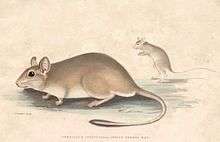Indian gerbil
| Indian gerbil | |
|---|---|
 | |
| Scientific classification | |
| Kingdom: | Animalia |
| Phylum: | Chordata |
| Class: | Mammalia |
| Order: | Rodentia |
| Family: | Muridae |
| Subfamily: | Gerbillinae |
| Genus: | Tatera Lataste, 1882 |
| Species: | T. indica |
| Binomial name | |
| Tatera indica (Hardwicke, 1807) | |
The Indian gerbil (Tatera indica) also known as "Antelope rat", is a species of gerbil in the family Muridae.
It is found in Afghanistan, India, Iran, Iraq, Kuwait, Nepal, Pakistan, Sri Lanka, and Syria. Also may occur in Bangladesh.[1]
It is the only species in the genus Tatera. Members of the genus Gerbilliscus have historically been placed in the genus Tatera.
Known as "weli meeya" or වැලි මීයා in Sinhala meaning 'Sand mouse".
Description
Head and body length is 17–20 cm. Tail is 20–21 cm. Dorsal surface including entire head is light brown or light brown with rusty wash. Underparts are white. Tail fully furred, dark blackish brown with grayish sides and prominent black tuft on tip. Fur on body soft, sparse underneath; tail fur is longer. Eyes are large and prominent. Bounding gait is distinguished when running.[2]
Reproduction
Both the sexes of this species lives apart. The relation between male and female gebrils is not known yet.[3]
Diet
Omnivorous. Known to eat grains, seeds, plants, roots, insects, reptiles and even small birds and mammals it can catch up.[2]
Notes
- ↑ https://portals.iucn.org/library/sites/library/files/documents/RL-549.3-003-v.2.pdf
- 1 2 Yapa, A.; Ratnavira, G. (2013). Mammals of Sri Lanka. Colombo: Field Ornithology Group of Sri Lanka. p. 1012. ISBN 978-955-8576-32-8.
- ↑ Stephanie Mott. "ADW: Tatera indica: INFORMATION". Animal Diversity Web. Retrieved 30 May 2015.
References
- B. Kryštufek; G. Shenbrot; M. Sozen & S. Molur (2008). "Tatera indica". IUCN Red List of Threatened Species. Version 2011.2. International Union for Conservation of Nature. Retrieved June 10, 2012.
- Musser, G. G. and M. D. Carleton. 2005. Superfamily Muroidea. pp. 894–1531 in Mammal Species of the World: a Taxonomic and Geographic Reference. D. E. Wilson and D. M. Reeder eds. Johns Hopkins University Press, Baltimore.
